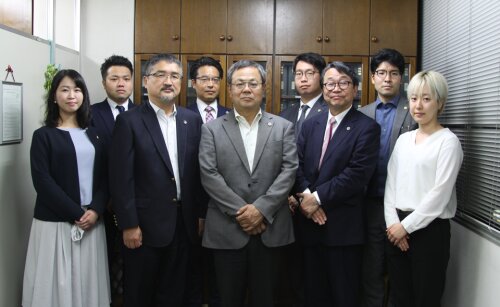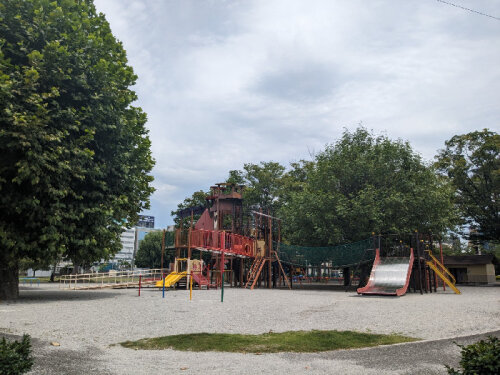Best Antitrust Litigation Lawyers in Shizuoka
Share your needs with us, get contacted by law firms.
Free. Takes 2 min.
List of the best lawyers in Shizuoka, Japan
About Antitrust Litigation Law in Shizuoka, Japan
Antitrust litigation in Shizuoka, Japan is part of the wider body of competition law enforced across the country. The core law is the Antimonopoly Act, which prohibits private monopolization, unreasonable restraint of trade such as cartels and bid-rigging, and unfair trade practices. Enforcement and policy are handled at the national level by the Japan Fair Trade Commission - JFTC - while civil claims for injunctions and damages are pursued in the ordinary court system. Cases with local connections - for example disputes between companies operating in Shizuoka or harm suffered by Shizuoka residents - will commonly be litigated in the Shizuoka District Court or its branches.
Antitrust matters can involve administrative investigations and orders from the JFTC, criminal prosecutions in serious cartel or bid-rigging cases, and private civil litigation seeking injunctions or monetary compensation. Understanding how these administrative, criminal, and civil tracks interact is important when assessing legal risk and deciding the best route to resolution.
Why You May Need a Lawyer
Antitrust disputes are legally and factually complex. You may need a lawyer if you are:
- A business that suspects competitors are coordinating prices, dividing markets, or rigging bids and needs advice about gathering evidence and whether to report the conduct to the JFTC or sue for damages.
- A supplier, contractor, or buyer impacted by unfair trade practices such as exclusionary tactics, discriminatory trading terms, or resale price maintenance.
- An individual or small business victim of a cartel or consumer-harming conduct seeking to pursue a civil claim for damages or an injunction.
- A company under JFTC investigation facing potential administrative orders or criminal exposure and in need of counsel to manage the investigation, consider leniency options, or plan defense strategies.
- A party contemplating settlement, mediation, or other alternative dispute resolution and needing help evaluating offers, drafting agreements, and protecting commercial interests.
Local Laws Overview
Key legal points relevant to antitrust litigation in Shizuoka reflect national law applied locally:
- Antimonopoly Act - The principal statute prohibiting cartels, bid-rigging, abuse of dominant position, and certain unfair trade practices. It provides the basis for administrative orders, criminal enforcement, and is the normative standard courts consider when assessing private claims.
- Enforcement Agencies - The JFTC is the national regulator that investigates potential violations, imposes administrative sanctions such as cease-and-desist orders and surcharge payment orders, and can refer serious cartel cases for criminal prosecution. Local parties can report suspected violations to JFTC and to local consumer or business support offices.
- Civil Remedies - Private parties may pursue injunctions to stop illegal conduct and monetary damages in civil court. Courts examine the Antimonopoly Act and general tort and contract law principles when deciding claims. Evidence from JFTC investigations can be influential in civil proceedings.
- Criminal Sanctions - Serious cartel and bid-rigging conduct can lead to criminal prosecution. Criminal liability for individuals and corporations is part of the enforcement landscape, making early legal advice critical for firms and personnel under investigation.
- Jurisdiction and Venue - Cases arising in Shizuoka are typically heard at the Shizuoka District Court or its branches, depending on the parties and where the conduct or harm occurred. Complex or large claims may still be litigated in other courts based on applicable civil procedure rules.
- Procedural Considerations - Antitrust litigation often requires detailed factual records, expert economic analysis, witness statements, and document production. Preservation of documents and careful handling of privileged materials are essential. Japan does not use broad discovery systems like some other jurisdictions, but courts can order limited disclosure and evidence production.
- Time Limits and Strategic Timing - Statutes of limitation and procedural deadlines vary with the type of claim. Because timing affects remedies and admissibility of evidence, consult counsel early to avoid losing rights.
Frequently Asked Questions
What types of conduct can lead to antitrust litigation in Shizuoka?
Typical conduct includes price-fixing, market allocation, bid-rigging, abuse of a dominant market position, and certain unfair trade practices such as discriminatory contract terms or exclusionary tactics. Any conduct that substantially restrains competition or harms consumers and competitors may trigger enforcement or civil claims.
Who enforces antitrust law in Japan and how does that affect private litigation?
The Japan Fair Trade Commission enforces the Antimonopoly Act administratively and refers serious cases to prosecutors for criminal action. Administrative findings and penalties by the JFTC can support private civil claims, but private plaintiffs can also bring civil suits independently of any JFTC action.
Can an individual bring an antitrust claim, or is it only businesses?
Individuals can bring claims if they have suffered harm from anticompetitive conduct. Examples include consumers overcharged by a cartel or a small business forced out of the market by unfair conduct. Remedies available to individuals include injunctions and damages.
What remedies are available in antitrust litigation?
Remedies include injunctions to stop illegal conduct, monetary damages for economic harm, and in some cases court-ordered measures to restore competition. Administrative actions by the JFTC can impose cease-and-desist orders and surcharge payments, which are separate from civil remedies.
How long does antitrust litigation usually take?
Duration varies widely. Simple cases may resolve in months through settlement or injunctions. Complex cartel or abuse of dominance cases with extensive evidence and economic expert analyses can take years. Administrative investigations by the JFTC and subsequent civil proceedings can add to the timeline.
What kind of evidence is needed to prove an antitrust claim?
Evidence can include internal documents showing agreement among competitors, emails or meeting notes, records of pricing or bidding behavior, market studies, testimony from involved persons, and expert economic analysis showing the effect on competition and damages. Early preservation of relevant records is crucial.
Should I report suspected cartel behavior to the JFTC or go straight to court?
Reporting to the JFTC may trigger an administrative investigation and can lead to powerful enforcement actions. In some cases, JFTC findings strengthen civil claims. However, strategy depends on objectives - rapid injunctive relief, compensation, or criminal referral. Discuss options with a lawyer experienced in antitrust law before deciding.
Are there leniency programs if a company was involved in a cartel?
The JFTC operates a leniency program that may provide immunity or reduced penalties to companies that fully cooperate and provide evidence of cartel conduct. Participation can protect a company from administrative sanctions and may affect criminal exposure. Legal advice is important before applying to avoid waiving privileges or worsening liabilities.
How much does antitrust litigation cost and are there fee alternatives?
Costs depend on case complexity, the need for experts, and litigation length. Fee arrangements include hourly rates, retainers, and in some situations success-fee arrangements. Public legal aid and initial consultations through support services may be available for qualifying parties. Ask potential lawyers for a clear cost estimate and fee structure.
Do I need a Shizuoka-based lawyer or can I hire counsel from another prefecture or Tokyo?
You can hire counsel from anywhere in Japan. Local knowledge of the Shizuoka courts, business community, and language can be helpful, but many national and Tokyo-based law firms routinely handle regional antitrust matters. Choose counsel with proven antitrust experience, familiarity with JFTC practice, and a strategy that fits your case.
Additional Resources
Useful organizations and resources to consult when facing antitrust issues in Shizuoka include:
- Japan Fair Trade Commission - the national antitrust regulator handling investigations, orders, and policy guidance.
- Consumer Affairs Agency - for consumer protection issues that overlap with competition concerns.
- Shizuoka District Court and Hamamatsu Branch - where civil antitrust cases with local connection are often heard.
- Shizuoka Bar Association - for referrals to qualified local attorneys experienced in antitrust and commercial litigation.
- Japan Legal Support Center - Houterasu - offers information about legal aid, consultations, and funding options for litigation in Japan.
- Shizuoka Prefectural Consumer Consultation Centers - for consumer complaints and guidance on administrative support.
- Industry associations and trade groups - for sector-specific guidance on compliance and dispute prevention.
Next Steps
If you think you have an antitrust problem in Shizuoka, take the following practical steps:
- Preserve evidence - Secure and preserve relevant documents, emails, bids, contracts, and internal records. Avoid destroying or altering potential evidence.
- Document harm - Keep records showing how the conduct affected prices, contracts, sales, or competitive opportunities.
- Seek an early consultation - Contact an attorney with antitrust experience as early as possible for an assessment of options, likely remedies, and risks. If cost is a concern, ask about limited-scope advice to evaluate next steps.
- Consider reporting options - Discuss the pros and cons of reporting to the JFTC, pursuing private litigation, or seeking alternative dispute resolution.
- Evaluate cost and strategy - Work with counsel to develop a litigation plan, timeline, and budget, including the potential role of experts and witnesses.
- Use local support - Reach out to local consumer support centers, the Shizuoka Bar Association, or Houterasu for guidance on legal aid and procedure.
Antitrust litigation combines technical economic issues with complex legal rules. Early expert advice tailored to your situation will help you protect rights, minimize risks, and choose the most effective path forward.
Lawzana helps you find the best lawyers and law firms in Shizuoka through a curated and pre-screened list of qualified legal professionals. Our platform offers rankings and detailed profiles of attorneys and law firms, allowing you to compare based on practice areas, including Antitrust Litigation, experience, and client feedback.
Each profile includes a description of the firm's areas of practice, client reviews, team members and partners, year of establishment, spoken languages, office locations, contact information, social media presence, and any published articles or resources. Most firms on our platform speak English and are experienced in both local and international legal matters.
Get a quote from top-rated law firms in Shizuoka, Japan — quickly, securely, and without unnecessary hassle.
Disclaimer:
The information provided on this page is for general informational purposes only and does not constitute legal advice. While we strive to ensure the accuracy and relevance of the content, legal information may change over time, and interpretations of the law can vary. You should always consult with a qualified legal professional for advice specific to your situation.
We disclaim all liability for actions taken or not taken based on the content of this page. If you believe any information is incorrect or outdated, please contact us, and we will review and update it where appropriate.









